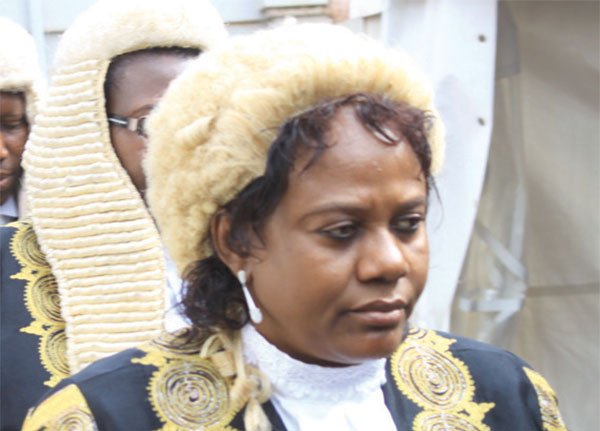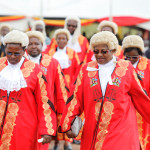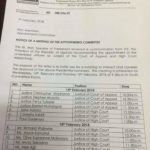President Museveni has appointed three new Judges to the Supreme Court, and one to the Court of Appeal.
In the statement released by the State House, the appointed Justices join the Supreme Court bench are Christopher Madrama, Elizabeth Musoke and Stephen Musota.
“In Exercise of powers vested in the President by Article 142 (1) of the 1995 Constitution, I have, acting on the advice of the Judicial Service Commission, appointed justices of the Supreme Court and Court of Appeal,” reads part of the statement.
Oscar Kihika, who has been serving as the NRM director for legal affairs, was appointed to the Court of Appeal.
“I hereby forward their names and CVs to parliament for approval,” adds the statement.
The Supreme Court of Uganda is the highest judicial organ in Uganda. It derives its powers from Article 130 of the 1995 Constitution.
It is primarily an appellate court with original jurisdiction in only one type of case: a presidential election petition.
The Supreme Court is constituted by the Chief Justice (CJ) who is appointed by the president in consultation with the Judicial Service Commission and not less than ten justices.
He is the head of the Judiciary and he is deputized by the Deputy Chief Justice who heads the Court of Appeal and other justices of the Supreme Court who must not be less than five (5) while hearing an Appeal (this is referred to as the quorum required for the court to hear any matter).
The Supreme Court is headed by the Chief Justice and supported by ten (10) Justices with the following quorum:-Constitutional Appeal Cases 7 Judges, Criminal Appeal Cases 5 Judges, Civil Appeal Cases 5 Judges
However in the absence of the Chief Justice, the most senior member of the Court presides over the sitting of the Supreme Court.
It sits eight sessions a year with a break of two weeks between sessions to do research and write judgments.
It has powers to uphold decisions from the lower courts, reverse them and to substitute judgments or to order for a new trial.
The procedure, powers and jurisdiction of the Supreme Court are regulated by the Supreme Court rules.
Christopher Izama Madrama
He studied law at Makerere University, Uganda’s largest and oldest public university, graduating in 1989 with a Bachelor of Laws (LLB) degree. The next year, he received a Diploma in Legal Practice, from the Law Development Centre, in Kampala, the national capital. He was then admitted to the Uganda Bar. Later, he obtained a Master of Laws degree in Women’s Law, from the University of Zimbabwe.
In 1990, he took up employment as a state attorney, in the Uganda Ministry of Justice and Constitutional Affairs, working in that capacity until 1999. He was then elevated to Principal State Attorney.
Later in 1999, he left the Justice ministry and joined the Law Development Centre as a Senior Legal Officer. From 2001 until 2010, Christopher Madrama was a Principal Legal Associate at Katende Ssempebwa and Company Advocates, a large firm in the city of Kampala, Uganda’s capital. This was his last job in the private sector, prior to joining the bench.
He was appointed as a judge of the High Court of Uganda in June 2010. Over the years, he served in various divisions of the high court, including the commercial division and the executions division. In February 2018, Madrama was appointed to the Uganda Court of Appeal and was successfully vetted by the Ugandan parliament.
Elizabeth Musoke
She earned a Bachelor of Laws (LLB) degree from Makerere University, the nation’s oldest and largest public University. She also obtained a Diploma in Legal Practice, from the Law Development Centre, in Kampala, the country’s capital city. She was admitted to the Uganda Bar as a practicing lawyer.
She worked with the ministry of justice for several years and left at the rank of Principal State Attorney to join the Inspectorate of Government as Director of Legal Affairs in 1999.
In July 2013, she was appointed to serve as a judge of the High Court of Uganda, assigned to the civil division, serving in that capacity until October 2015, when she was elevated to the Court of Appeal, which doubles as the Constitutional Court of Uganda.
Stephen Musota
He is a Ugandan lawyer and judge, on the Court of Appeal of Uganda, which doubles as the country’s Constitutional Court. He was appointed to the court of appeal on 8 February 2018.
He studied law at Makerere University, Uganda’s largest and oldest public university, graduating in 1982 with a Bachelor of Laws (LLB) degree. The next year, he received a Diploma in Legal Practice, from the Law Development Centre, in Kampala, the national capital. He was then admitted to the Uganda Bar.
In 1984, he was appointed as a Magistrate Grade One, rising to the level of Senior Principal Magistrate Grade One in 1992. He went on to work as Chief Magistrate, then as Deputy Registrar and then as Registrar of the High Court.
Later in 2000, he was promoted to the position of the chief registrar of the Judiciary, serving in that capacity until 2004. In 2004 he was appointed to the bench, as a member of the High Court of Uganda. He has a special interest in Civil Law.
He was appointed as a judge of the High Court of Uganda in 2004. He served as the head of the civil division of the high court. In February 2018, Musota was appointed to the Uganda Court of Appeal and was successfully vetted by the Ugandan parliament.








Thank you ever so for you article.Thanks Again. Will read on…